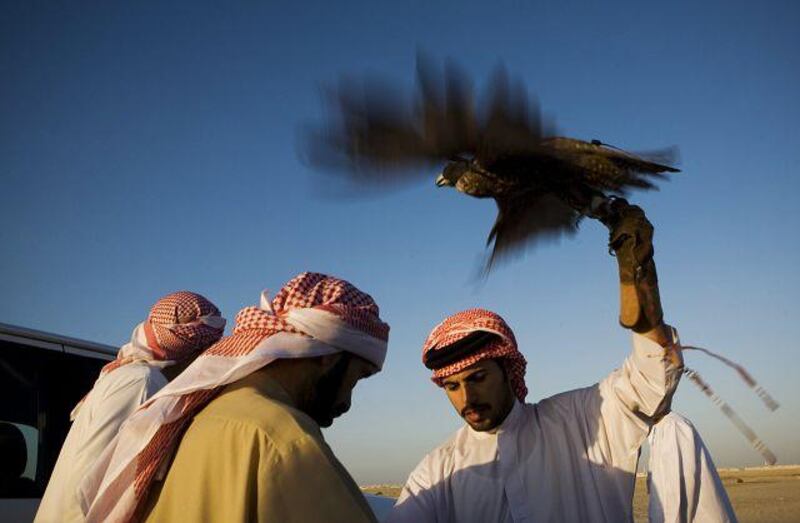ABU DHABI // The UAE will try to get Unesco world heritage status for the sport of falconry by the end of the summer, having received the backing of a dozen countries. The Emirates is leading the international effort to protect falconry as a part of world cultural heritage.
About 65 nations practise training birds of prey for hunting game. The formal submission will be made on Aug 31. Nick Fox, the director of International Wildlife Consultants based in Wales, is supporting the Emirates Falconers' Club to safeguard the 4,000-year-old tradition under the Unesco Convention on Intangible Cultural Heritage. He said the forthcoming International Festival of Falconry - to be held in Reading, England, in July - would be a springboard for demonstrating the sport to invited Unesco delegates.
"We're trying to preserve these old values and continue a love of the deserts in the younger generations so the cultural connection isn't broken," Mr Fox said. "We're into a new generation - a generation which is much more into the modern world but is losing its contact with its natural and cultural heritage. We're trying to retain a national identity in danger of being swamped by international technology."
Apart from the UAE, other nations to have signed the Unesco submission include Mongolia, Morocco, Turkey, Qatar and Saudi Arabia. "If a country signs up, it means that it will undertake to look after that aspect of heritage - whether through laws, grants or favourable treatment of practitioners," said Mr Fox, who also worked for 20 years as a falcon conservationist at the Environment Agency-Abu Dhabi.
"It's to keep that cultural strand alive ... because you end up saying what actually is the UAE about? And falconry is right at the centre as something the UAE does that many other nations don't." While the Unesco convention was written to protect tangible heritage "such as bricks and mortar, pyramids and Taj Mahals", he said the new proposal on intangible cultural heritage is meant for protecting endangered languages, rituals, traditional arts and craftsmanship and festivities.
"We're not trying to turn the clock back and turn us all back into Bedouins in the desert, but we are trying to preserve the values that the old culture had - of loyalty, perseverance, humility," Mr Fox said. "Because a falcon doesn't care who is handling it, and the sun's going to shine just as hard on you whoever you are and you're going to get just as thirsty." He expects between 10,000 and 20,000 visitors from 50 nations to attend the two-day Festival of Falconry. The event, which begins July 11, is organised by the UK Hawk Board and the Emirates Falconers' Club is a major sponsor.
Sheikh Sultan bin Tahnoun Al Nahyan, the chairman of the Abu Dhabi Tourism Authority, will be there and Mr Fox is waiting for confirmation from other high-level delegates from the UAE. About 500 schoolchildren from Abu Dhabi are also scheduled to visit the exhibits and learn about the differences between Arabian and European falconry styles. For instance, Mr Fox explained, a nation with an open desert means falcons can be trained for distance, whereas falcons that hunt in woodland areas are trained for quick attacks to catch pheasants within 50 metres.
The UAE will participate in a parade of nations, he added, and have a "camp" displaying traditional food as well as information on Arabian horses, camel breeding and traditional saluki hunting hounds. The International Fund for Houbara Conservation (IFHC), set up by the Abu Dhabi Government to protect the prized houbara bustard birds of prey through a captive breeding programme, will be another focus of the festival.
Mohammed Saleh al Baidani, the director general of the IFHC, told the state news agency WAM yesterday: "The UAE has had a long-standing commitment to conservation and we are proud to increase awareness of our global initiatives in breeding, research and habitat conservation at this year's festival with the falconers of the world." Illegal hunting and loss of habitat have drastically depleted the houbara bustard population in the region. Last year, however, the IFHC introduced 250 birds into the wild in the UAE from a batch of 980 bred the same year.
mkwong@thenational.ae






